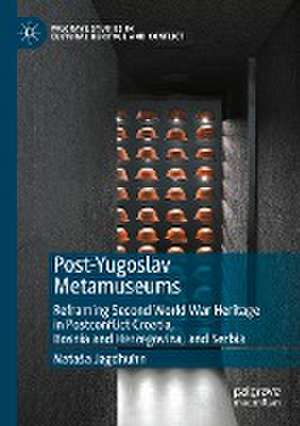Post-Yugoslav Metamuseums: Reframing Second World War Heritage in Postconflict Croatia, Bosnia and Herzegovina, and Serbia: Palgrave Studies in Cultural Heritage and Conflict
Autor Nataša Jagdhuhnen Limba Engleză Paperback – 22 sep 2023
| Toate formatele și edițiile | Preț | Express |
|---|---|---|
| Paperback (1) | 385.84 lei 6-8 săpt. | |
| Springer International Publishing – 22 sep 2023 | 385.84 lei 6-8 săpt. | |
| Hardback (1) | 390.84 lei 6-8 săpt. | |
| Springer International Publishing – 21 sep 2022 | 390.84 lei 6-8 săpt. |
Din seria Palgrave Studies in Cultural Heritage and Conflict
- 20%
 Preț: 568.11 lei
Preț: 568.11 lei - 15%
 Preț: 696.68 lei
Preț: 696.68 lei -
 Preț: 415.77 lei
Preț: 415.77 lei - 18%
 Preț: 780.19 lei
Preț: 780.19 lei - 15%
 Preț: 589.33 lei
Preț: 589.33 lei - 18%
 Preț: 737.57 lei
Preț: 737.57 lei - 15%
 Preț: 594.24 lei
Preț: 594.24 lei - 18%
 Preț: 786.84 lei
Preț: 786.84 lei - 18%
 Preț: 949.42 lei
Preț: 949.42 lei - 18%
 Preț: 733.03 lei
Preț: 733.03 lei - 18%
 Preț: 901.11 lei
Preț: 901.11 lei - 18%
 Preț: 792.34 lei
Preț: 792.34 lei - 20%
 Preț: 767.40 lei
Preț: 767.40 lei - 15%
 Preț: 588.18 lei
Preț: 588.18 lei -
 Preț: 233.58 lei
Preț: 233.58 lei - 18%
 Preț: 726.06 lei
Preț: 726.06 lei -
 Preț: 380.45 lei
Preț: 380.45 lei -
 Preț: 386.39 lei
Preț: 386.39 lei - 18%
 Preț: 777.69 lei
Preț: 777.69 lei - 18%
 Preț: 784.13 lei
Preț: 784.13 lei - 18%
 Preț: 894.79 lei
Preț: 894.79 lei - 18%
 Preț: 725.13 lei
Preț: 725.13 lei -
 Preț: 484.47 lei
Preț: 484.47 lei - 15%
 Preț: 640.71 lei
Preț: 640.71 lei - 18%
 Preț: 730.97 lei
Preț: 730.97 lei -
 Preț: 390.25 lei
Preț: 390.25 lei -
 Preț: 388.13 lei
Preț: 388.13 lei -
 Preț: 385.84 lei
Preț: 385.84 lei
Preț: 385.84 lei
Nou
Puncte Express: 579
Preț estimativ în valută:
73.83€ • 77.08$ • 61.10£
73.83€ • 77.08$ • 61.10£
Carte tipărită la comandă
Livrare economică 04-18 aprilie
Preluare comenzi: 021 569.72.76
Specificații
ISBN-13: 9783031102301
ISBN-10: 3031102304
Ilustrații: XIII, 259 p. 40 illus., 35 illus. in color.
Dimensiuni: 148 x 210 mm
Greutate: 0.36 kg
Ediția:1st ed. 2022
Editura: Springer International Publishing
Colecția Palgrave Macmillan
Seria Palgrave Studies in Cultural Heritage and Conflict
Locul publicării:Cham, Switzerland
ISBN-10: 3031102304
Ilustrații: XIII, 259 p. 40 illus., 35 illus. in color.
Dimensiuni: 148 x 210 mm
Greutate: 0.36 kg
Ediția:1st ed. 2022
Editura: Springer International Publishing
Colecția Palgrave Macmillan
Seria Palgrave Studies in Cultural Heritage and Conflict
Locul publicării:Cham, Switzerland
Cuprins
Chapter 1: Introduction – Second World War Heritage as (Dis)Integration Tool.- Part I: Museums of the People’s Liberation Struggle in Yugoslavia (1945–1990).- Chapter 2: The Yugoslavization of the Museum Sphere.- Chapter 3: The People’s Liberation Struggle Museum.- Part II: Second World War Memorial Museums in the Yugoslav Successor States (1991–2022).- Chapter 4: Broken Museality.- Chapter 5: Curating (in) Transition.- Chapter 6: Exhibitions as Dysfunctional Mosaic Narratives.- Chapter 7: Conclusion – Transitional Metamuseology.
Notă biografică
Nataša Jagdhuhn is a Museologist whose research focuses on memory constructs in the successor states of Yugoslavia, museum transformation in the post-socialist countries of Europe, the history of museology from a Global South perspective, and current debates on decolonizing heritage worldwide.
Textul de pe ultima copertă
This book analyzes how Second World War heritage is being reframed in the memorial museums of the post-socialist, post-conflict states of Croatia, Bosnia and Herzegovina, and Serbia. It argues that in all three countries, a reluctance to confront undesirable parts of their national histories is the root cause explaining why the state-funded Second World War memorial museums remain stuck in the postsocialist transition. In most cases, Second World War museums, exhibitions, and displays conceived in the Yugoslav period have been left unchanged. However, there are also examples where new sections were added to the old ones and there are a small number of completely reconceptualized permanent exhibitions. The transitional position of the Second World War museums has made it possible to view these institutions as historical formations in their own right. The book will appeal to students and academics working in the fields of heritage and museums studies, memory studies, and cultural history of Southeast-Europe.
Nataša Jagdhuhn is a Museologist whose research focuses on memory constructs in the successor states of Yugoslavia, museum transformation in the post-socialist countries of Europe, the history of museology from a Global South perspective, and current debates on decolonizing heritage worldwide.
Caracteristici
Analyzes how Second World War heritage is being reframed in the memorial museums of the post-socialist Appeals to students and academics working in the fields of heritage and museums studies Argues the transitional position of the Second World War museums makes it possible to view them as historical formations
